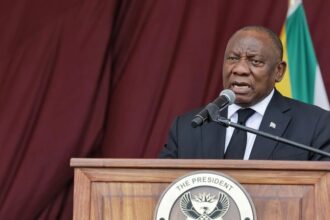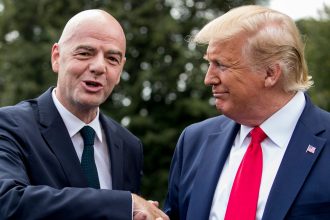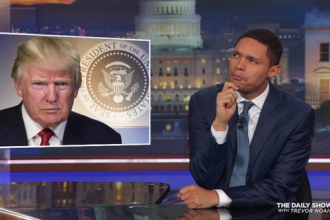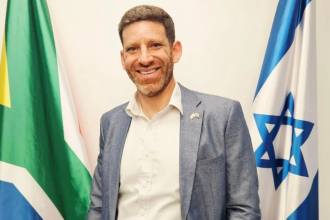Donald Trump has added South Africa to his growing list of international grievances, threatening to cut funding and trade benefits over the country’s newly enacted Expropriation Act.
In a post on his Truth Social platform, Trump claimed that South Africa is confiscating land and accused the government of treating “certain classes of people very badly.” He went further, calling the policy a “massive human rights violation” and vowed that the US “won’t stand for it.”
Without providing evidence, Trump declared:
- Advertisement -“I will be cutting all future funding to South Africa until a full investigation of this situation has been completed.”

His remarks sent ripples through financial markets. The rand weakened past R19 per US dollar in early Monday trading before recovering slightly. Investors are also closely watching the Johannesburg Stock Exchange (JSE) for further reaction.
Understanding South Africa’s Expropriation Act
The Expropriation Act, signed into law by President Cyril Ramaphosa in January 2025, has reignited debates around land reform in South Africa. While Trump and some opposition parties have labeled it a land grab, the government insists it is a legally sound process aimed at addressing historic inequalities.
Key points about the Expropriation Act:
- Not a land confiscation law – it follows constitutional guidelines for land reform.
- Equitable compensation required – landowners are compensated except in exceptional cases (e.g., abandoned land).
- Aligns with global practices – many countries, including the US, have expropriation laws for public interest purposes.
Despite assurances, opposition parties like the Democratic Alliance (DA), Action SA, and Freedom Front Plus (FF+) have threatened legal challenges, arguing that it will deter investors and harm property rights.
SA Government Responds to Trump’s Threats
The South African Presidency wasted no time in responding, issuing a statement on Monday morning, dismissing Trump’s claims as misinformation.
“South Africa is a constitutional democracy that is deeply rooted in the rule of law, justice, and equality. The government has not confiscated any land.”
The statement, delivered by Presidential spokesperson Vincent Magwenya, further clarified:
- The Expropriation Act is not a confiscation tool but a constitutional mechanism for equitable land access.
- South Africa has always had expropriation laws, similar to the United States and other democracies.
- Ramaphosa is open to discussions with Trump on land reform and broader US-SA relations.
The Presidency also downplayed the financial threat, pointing out that the US provides limited direct funding to South Africa, with the exception of the PEPFAR HIV/AIDS program, which covers 17% of the country’s HIV treatment costs.
What US Funding Does South Africa Receive?
Trump’s statement raises questions about what funding the US actually provides to South Africa.
According to Bloomberg, citing a 2023 Congressional Research Service report, the US has provided over R152 billion ($8
R151.67 billion) in bilateral aid to SA over the past two decades.
Key funding sources:
- PEPFAR (HIV/AIDS support) – the largest US aid program in SA.
- Trade benefits through Agoa – allows SA exports duty-free access to the US market.
- Other foreign aid – including education, health, and economic development programs.
Could Trump Remove South Africa from Agoa?
One of the biggest concerns is that Trump could remove SA from the African Growth and Opportunity Act (Agoa), which provides trade preferences for African countries exporting to the US.
- The Biden administration extended Agoa to SA and other African nations in December 2024, but only for one year—meaning its status is already uncertain.
- South Africa’s trade relationship with the US is significant, with exports worth billions of rands annually benefiting from Agoa.
- Trump’s America First policies suggest he could push for harsher tariffs on SA goods or cut Agoa benefits altogether.
If that happens, it could hurt South Africa’s automotive, agriculture, and manufacturing sectors, which rely on duty-free access to the US market.
What Happens Next?
The Trump-Ramaphosa standoff over land reform is far from over. While Trump’s threats might not have an immediate impact, the uncertainty around US-SA trade relations could rattle investors and policymakers.
Here’s what to watch for:
- Will Trump follow through? His executive orders have already cut WHO funding—could South Africa be next?
- Impact on the rand and markets – investors are closely watching how Trump’s comments affect the JSE and exchange rates.
- Ramaphosa’s response – will he engage directly with Trump to prevent a trade fallout?
- Agoa negotiations – Trump’s administration could review South Africa’s eligibility for US trade benefits.
For now, South Africa remains committed to its land reform policies, and the government has reassured investors and international partners that property rights remain protected under the Constitution.
Final Thoughts
Trump’s intervention in South Africa’s land expropriation debate has sparked international headlines, but whether it leads to real economic consequences remains to be seen.
As the 2025 US presidential elections approach, South Africa finds itself unexpectedly caught in Trump’s political playbook. Whether this escalates into a full-blown trade dispute or simply political rhetoric will depend on how both governments navigate the situation in the coming months.
For now, South Africa’s land reform debate is officially global news—with the world watching closely.












